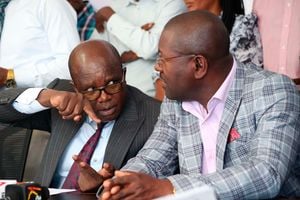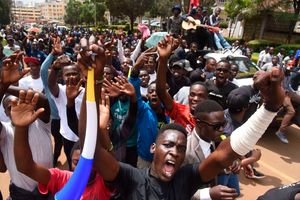
Education CS nominee Julius Ogamba.
About 50,000 first-year university students have not paid their tuition fees even after receiving funding from the government under the higher education funding model and risk not sitting their examinations at the end of the semester.
As a result, members of Parliament on Tuesday, September 24, instructed Education Cabinet Secretary Julius Ogamba to issue a circular directing universities to allow the students to sit examinations even when they have not fully paid their tuition fees.
Out of the 138,535 students placed by the Kenya Universities and Colleges Central Placement Service (Kuccps), 124,364 have already reported. However, only 75,000 of them have been able to fully pay their tuition fees.
The details emerged when Mr Ogamba appeared before the National Assembly Committee on Education. The MPs expressed dismay at the implementation of the higher education funding model, saying that students should be allowed to sit the examinations and not be negatively affected until the government fixes the challenges facing the model.
The MPs called for an overhaul of the new university funding model after nearly half of the students were placed in the wrong category.
Right answers
“Please CS issue a circular directing universities that students be allowed to sit exams before this issue of means testing instrument (MTI) is addressed,” said the chair of the committee Julius Melly.
“These MTIs you are using are not giving us the right answers. We have had six meetings with the PS and those in this sector where they have taken us through the various variables and validators but we have not gotten any answers. What are you doing to ensure that you give us the right MTI that can give the right date,” Mr Melly added.
Marakwet East MP Timothy Toroitich proposed that the new funding model be suspended to allow Parliament to scrutinise it since it is not working.
According to Mr Ogamba, 11,132 students have appealed against the allocation of scholarships and student loans. Of these, 6,548 students cited the high cost of the programmes they are studying as the main challenge. These students have been categorised into Band 4 (2,150) and Band 5 (2,433).
Under Band 4, students get a maximum funding of 40 per cent of the programme cost as a scholarship, 30 per cent as a loan and the family is expected to pay the remaining 30 per cent as well as upkeep for the student while on campus.
Students in Band 5 qualify for a maximum of 30 per cent of the programme cost as a scholarship, 30 per cent loan and then the household is expected to foot the balance of 40 per cent. Academic programmes in universities range between Sh144,000 for the cheapest and Sh600,00 for the most expensive.
“The appeals window is still open, until December 2024. The appeals are processed on a rolling basis. The outcome of the appeals will be communicated to the specific students,” Mr Ogamba said.
Nationwide strike
The funding model which was introduced last year has come under criticism from students and their families. Two weeks ago, students had planned a nationwide strike but called it after intervention by the government. President William Ruto has since appointed a 129-man committee to review the model.
Mr Ogamba blamed what he termed misinformation for the negative reception of the funding model and admitted that the Ministry of Education has not done enough to sensitise the public.
“It has emerged that the sensitisation of the public about the student-centred funding model was not adequate. Stakeholders and the general public did not understand the objectives and the workings of the model. This created confusion and allowed opportunity for misinformation,” he said.
Lugari MP Nabii Nabwera questioned how Band 5 of the categorisation of students was arrived at without the approval of Parliament.
Nyamira Woman Representative Jerusha Momanyi claimed that many students who are opposed to the new funding are being forced to accept it or else they will not receive any funding.
“The concerns received from students is that you are not ready to deal with this model and are forcing the funding model down their throat. What are you doing as a ministry to correct this?” she asked
Kibra MP Peter Orero told the CS to find a way out of the mess of the funding model.
“Mr CS, what are you doing to get us out of this problem,” asked Mr Orero.










